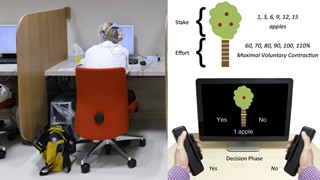
The Oxford/McGill/ZNZ collaborative project “Motivating change, changing motivation: A neuroscientific examination of effort evaluation and engagement in healthy older adults” was awarded funding from the Velux Foundation. We talked with Prof. Tobler of the Department of Economics, University of Zurich to learn more about the Healthy Aging project.
ZNZ News: Why is it important to study motivation in older people?
Philippe Tobler: Motivation is central to human behavior and is known to be important in healthy aging. Reduced motivation is, however, very common in older age. Despite its importance, we know remarkably little about the mechanisms that underlie motivation, how to best measure it and to intervene to improve motivation.
What is the goal of the project?
Together with our colleagues at McGill University and the University of Oxford, we want to understand what motivation is and try to improve it with modulation in healthy older subjects. The goal is to look at physical and cognitive motivation as well as self-reported motivation versus outcomes of laboratory tests. The results from this three year study will show whether a specific component of motivation, the willingness to exert physical or cognitive effort, can be modified. This will contribute to our understanding of the neural basis of this process.
How is motivation measured?
We measure motivation in healthy test persons that perform tasks in front of a monitor in a laboratory setting. To determine the willingness to exert physical effort, we use a test in which participants have to decide whether or not they want to take the effort (squeezing a handgrip device) to get apples from an apple tree. In this set-up the test person can see beforehand how much effort will be required to gain a specific number of apples and can decide to go for it or pass. In the cognitive effort task we give people choices to do an easy or an intellectually more demanding task. These are well-established tests that will give a score to the willingness to exert effort for each test person.
We will also examine how well self-reported willingness to exert effort and the scores in the laboratory tasks correlate. From these experiments we hope to learn how we can best measure motivation.
How will you modulate motivation?
We will use two different interventions to increase motivation. Dopamine has been described in the literature as the main neurotransmitter system involved particularly in physical motivation but may also play a role in cognitive motivation. The team in Oxford will therefore use dopamine medication to study its effects on physical and cognitive motivation. We will compare willingness to exert effort when people are or on medication to when they are off medication.
In Zurich we will modulate willingness to exert effort exertion by using transcranial direct current stimulation (tDCS) of the frontal pole, a region of the brain previously implicated in motivation. tDCS is a standard non-invasive method to up- or down regulate neural excitability and is routinely used for clinical and basic science purposes.
In a third experiment, at McGill we will not intervene to change motivation, but rather compare health outcome measurements related to motivation between a group of HIV elderly subjects and healthy younger adults. We use HIV patients because well-controlled HIV infection is a useful model of accelerated aging in humans.
Who will benefit from the results?
This Healthy Aging Velux project aims at understanding the motivation to exert physical and cognitive effort. We hope that the insights gained in this project can be the basis for future treatment in the form of improving motivation in elderly subjects. If our approaches show promise, they could be readily translated to clinical settings, or to at risk healthy older adults.
Participating research groups
Prof. Lesley Fellows, Department of Neurology & Neurosurgery, McGill University More
Prof. Masud Husain, Department of Experimental Psychology & Department of Clinical Neuroscience, University of Oxford More
Prof. Philippe Tobler, Department of Economics, University of Zurich More
Prof. Todd Hare, Department of Economics, University of Zurich More
About the Velux Foundation
Velux Foundation is a charitable foundation that supports research about daylight, healthy aging and ophthalmology. The foundation, located in Zurich, is active worldwide and supports innovative projects which generate lasting progress for the benefit of mankind. More